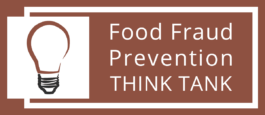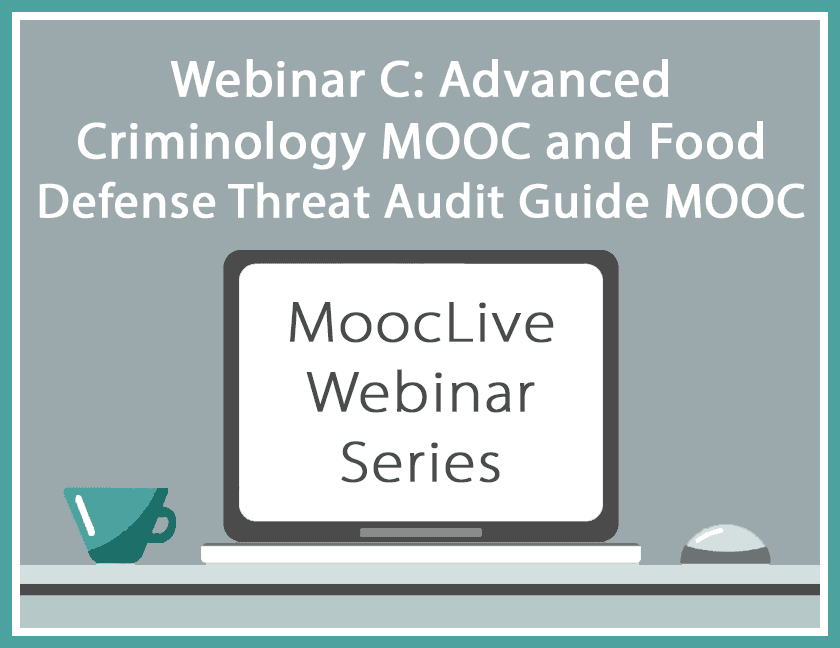Food Fraud Prevention MoocLive Webinar C: Advanced Criminology MOOC and Food Defense Threat Audit Guide MOOC – April 14, 16, 21 & 23, 2025
$250.00
DATES: April 14, 16, 21 & 23, 2025 (two hours each over 4 days)
TIMES (Eastern Time Zone US/New York): 10:00 a.m. – 12:00 noon
LOCATION: Live webinar
INSTRUCTOR: Dr. John W. Spink, PhD
ATTENDEES: All
CERTIFICATES: Included, upon completion of final quiz
OFFICE HOURS: One virtual “office hours” meeting (half hour) is included
SUMMARY: A live, interactive webinar version of our on-demand asynchronous MOOCs, led by Dr. Spink, that covers the application of criminology and crime prevention theory, as well as the GFSI standards-based food defense audit requirements. (Note: many of the food safety standards apply similar food fraud and food defense requirements.)
This course content is based on multiple research projects and over fifty scholarly articles (see list of publications).
There is often a recommendation to ‘think like a criminal’ when conducting food fraud prevention, but there is rarely a structured approach to understanding the ‘crime opportunity.’ While traditional food safety and food integrity methods are logical, they are often not based on addressing the specific root causes or ‘the chemistry of the crime.’ The criminology approach to food fraud prevention is also directly applicable to food defense (acts committed to cause economic harm, public health harm, or terror). This live and interactive webinar provides this in-depth coverage, and the scheduled format helps prioritize the completion of the course. This is a live version of the on-demand MOOC programs.
Why Attend:
- Thoroughly understand the criminology concepts of situational crime prevention, routine activities theory, and rational choice theory.
- Expand the ‘think like a criminal’ approach to apply methods such as the Food Fraud Suspicious Activity Report survey (FFSAR) – this was developed based on discussions about the research and training needs of INTERPOL/ Europol Operation OPSON members.
- Beyond food fraud, expand to apply the methods and procedures to GFSI-related (e.g., BRC/ BRCGS, FSSC 22000, IFS, SQF and others) food defense compliance requirements. Note: this training is cited in food standards such as the FSSC 22000 Food Defense Guidance Document.
Deliverables:
- Scheduled, live online instruction with Dr. Spink, plus interactive Q&A sessions.
- Food Fraud Trends Update presentation included, which will cover insights and hot topics.
- Pre-event survey for submitting your questions.
- Post-webinar quiz to earn your Certificates of Completion for both MOOCs, which count toward your Master Certificate in Food Fraud Prevention.
- Individual discussion during a 1-on-1 virtual office hours meeting with Dr. Spink (optional and self-scheduled, dates available for 5 weeks from start of webinar).
Overview:
This webinar includes two MOOCs: ‘Advanced Criminology’ (including the Food Fraud Suspicious Activity Report method survey) and ‘Food Defense Threat Audit Guide.’ These are complementary since the countermeasure and control systems for reducing the food fraud crime opportunity should simultaneously support reducing the food defense threats.
Advanced Criminology
This webinar begins with the Food Fraud Prevention: Advanced Criminology MOOC. This advanced course in the Food Fraud Prevention training series provides an overview of Advanced Criminology and an introduction to the Food Fraud Incident Template. This course was developed after a request from the private and public sector because of the need for a standardized template and publicly available training. The foundation of the course is the Food Fraud Incident Template, which is a simple survey that helps gather complete information – or clearly identifies what information is missing, unavailable, or unknowable. The template may seem simplistic, but it is based on criminology concepts including Intelligence Analysis, Food Document Fraud, Crime Scene Investigation (CSI), the Investigations and the Food Fraud Suspicious Activity Report (FFSAR), and then a scenario for training before the conclusion. Together, these lessons will create a broad and thorough foundation of understanding that will increase capacity and capability-building in food fraud prevention. The goal is to increase understanding of the problem so that there can be more efficient communication and food fraud prevention resource allocation.
Specifically, the FFSAR was developed during the INTERPOL/ Europol Operation OPSON meetings and presentations in 2017 (Dublin), 2019 (Athens), 2021 (Lisbon), and 2022 (Copenhagen).
Food Defense Threat Audit Guide
Next, the webinar continues with the Food Defense Threat Audit Guide MOOC. This advanced course in the Food Fraud Prevention training series provides an additional support for audit compliance that covers food defense. It builds in parallel to the Food Fraud Prevention Audit Guide MOOC and provides an in-depth review of compliance requirements including: US Food Safety Modernization Act (FSMA), Global Food Safety Initiative (GFSI), US Sarbanes-Oxley (SOX), and others.
Agenda:
- LESSON 1 – ADVANCED CRIMINOLOGY MOOC (DAY 1 and DAY 2, two-hour sessions each):
- Day 1 – Criminology
- Intelligence Analysis
- Food Document Fraud
- Crime Scene Investigations
- Food Fraud Investigations
- Day 2 – Application and Training
- FFSAR, Hot Spot, PCICT, Mass Balance, Authenticity, etc.
- Investigation Template – Application and Training
- Application and Conclusion
- Day 1 – Criminology
- LESSON 2 – FOOD DEFENSE THREAT AUDIT GUIDE MOOC (DAY 3 and DAY 4, two-hour sessions each):
- Day 3 – Food Defense and GFSI
- Food Defense
- GFSI
- FSMA
- ISO and Sarbanes-Oxley (SOX)
- Day 4 – Compliance and Management
- GFSI & Audits
- FSSC
- SQF
- IFS, BRC, PAS96
- INTL and Other US
- ERM and Conclusion
- Food Fraud Trends Update
- Day 3 – Food Defense and GFSI
Background:
The “MoocLive” concept was created, at the request of students, to add live, scheduled courses to our professional education catalog. Many students had good intentions to take our on-demand courses, but the lack of urgency often led to the training time commitment being put on the back burner. Adding the scheduled webinars to your calendar provides motivation and time commitment to complete the course.
These MoocLive webinars, which are the live, interactive versions of the on-demand MOOC courses, have the added benefit of including 1-on-1 office hours with Dr. Spink. This optional meeting offers you the opportunity for live, customized discussion.
The MOOC programs are still offered in the recorded, on-demand format on our website. The MoocLive concept is a return to the original format. When the MOOC programs were started in 2013, they were only offered in scheduled, live sessions. In 2018, based on student needs, the program was converted to a recorded, on-demand format.
For you or your employees, register for the MoocLive series to continue your Food Fraud Prevention training. Also, upon completing the prerequisite courses and obtaining the certificates of completion, the student is eligible for the Master Certificate in Food Fraud Prevention.
Questions:


